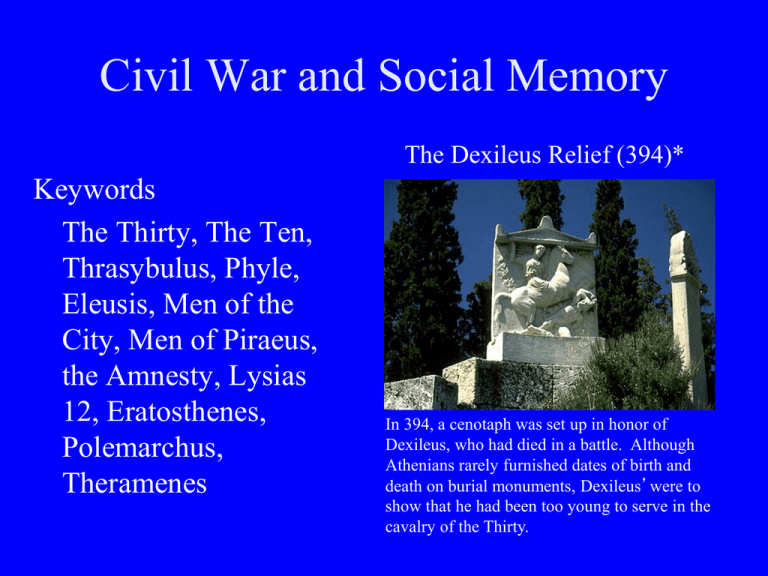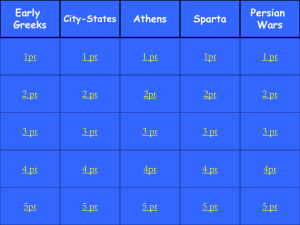Law as Civic Memory
advertisement

Civil War and Social Memory The Dexileus Relief (394)* Keywords The Thirty, The Ten, Thrasybulus, Phyle, Eleusis, Men of the City, Men of Piraeus, the Amnesty, Lysias 12, Eratosthenes, Polemarchus, Theramenes In 394, a cenotaph was set up in honor of Dexileus, who had died in a battle. Although Athenians rarely furnished dates of birth and death on burial monuments, Dexileus’were to show that he had been too young to serve in the cavalry of the Thirty. Surrender to Sparta 1. Athens loses Battle of Aegospotami (405). 2. In 404, in a peace brokered by Theramenes, the Athenians surrender to Sparta, thus ending the Peloponnesian war (431-404). 3. Athenians must demolish some of their fortifications, surrender nearly all of their fleet, dissolve the empire, and become a member of the Peloponnesian League. Rule of The Thirty 1. A few months after the surrender, oligarchic conspirators, known as the Thirty, overthrow the democracy and seize control of Athens. 2. All metics and all Athenians, except the wealthiest 3,000, are banished from the city. 3. Those who remain in Athens become known as the “Men of the City.” 4. Property of many metics and disfranchised Athenians is confiscated. 5. 1,500 Athenians executed. The Men of Piraeus 1. Thrasybulus, with a band of exiles, first seizes Phyle (a fortress on the outskirts of Attica) and later takes control of the Piraeus (the port of Athens); Piraeus becomes the democratic base. 2. The Thirty are exiled and retreat to Eleusis; the Ten are installed and continue the war against the men of Piraeus. 3. Sparta first helps the Ten, but later begins negotiations between the Men of Piraeus and the Men of the city. Reconciliation 1. Terms: a. Democracy restored in Athens b. Amnesty for all crimes except murder and attempted murder by one’s own hands; all included in the amnesty except the Thirty, the Ten, and the Eleven unless they undergo a euthyna. c. Eleusis granted political autonomy 2. Democrats conquer Eleusis (401), which is reintegrated into Athens, and the amnesty is extended to the remaining oligarchic supporters. Success of the Reconciliation 1. 2. 3. 4. 5. Sparta? No. Weakness of the democrats? No. Decline in civic participation? No. Terms of the Amnesty? No. Speeches help us understand not why the reconciliation was a success, but how they do and do not come to terms with the past. 6. Law courts a medium for social memory (cf. Vietnam Memorial, Forest Gump, Extremely Loud and Incredibly Close). Lysias 12 (background) 1. Speaker: Lysias. Only extant speech written by Lysias for him to deliver on his own behalf. 2. Defendant: Eratosthenes, a member of the Thirty. 3. Action: Euthyna to determine whether terms of the amnesty can be applied to Eratosthenes. 4. Main argument of Lysias: Eratosthenes cannot enjoy privileges of the amnesty because he is responsible for the death of Polemarchus (Lysias’ brother). 5. Date sometime after 403 and before 401. 6. Outcome: ???? Pathos of Lysias 12 • Prologue (opening): 1-3 • Epilogue (conclusion): 98-100 The Strategy of the Defense • Eratosthenes was a good oligarch • He opposed the rounding up and arrest of the metics • He was aligned with Theramenes • Others too will pay for their actions • Fear of civil unrest Response of Lysias Telescoping of Time Democrats believed oligarchic conspiracies cause Athens to lose the Battle of Aegospotami and surrender to Sparta. Defeat Surrender Rule of The Thirty Lysias collapses the defeat, surrender, and overthrow of democracy into one event by blaming Theramenes and the Thirty for all three (see Lys. 12.36-40, 62-79) United Demos 1. Jury referred to as men of Piraeus even though some must have remained in the city (e.g., Lys.12.56). 2. Jury stands for the demos, thus cannot be divided, cannot consist of oligarchic supporters. 3. Such an image depicts the Athenian people as though it had remained united during the civil war. 4. Such an image serves to hide the divisions and factionalism remaining in Athens after the reconciliation. Exception to the United Demos Imagery • Lys. 12.92-95 • Lysias calls on the Men of the City and the Men of Piraeus separately and explains why they should both hate Eratosthenes. Democratizing of Aristocratic virtues Lysias 12.94: “Realize that you [i.e., the Men of the City] live as citizens with men [i.e., the Men of the Piraeus] who are now the best (“aristoi”). What does Lys 12 tell us about the Reconciliation? • As disputes such as Lysias 12 come to court and litigants describe the demos as though it had remained united during the civil, do they alleviate Athenian fear and anxiety so that the reconciliation can work? Lys. 12.80: “Do not make plans against the Thirty in their absence only to let go of them when you have them. And do not protect yourselves less zealously than does Fortune, who has surrendered them? Lys 12.84-85: I think that the man would have to be very bold who comes here to defend himself…Either he thinks so little of you or has so much trust in others…Their supporters come here not to help them but because they believe that they will have much impunity for their own actions and can do whatever they want in the future… The Theramenes Myth




